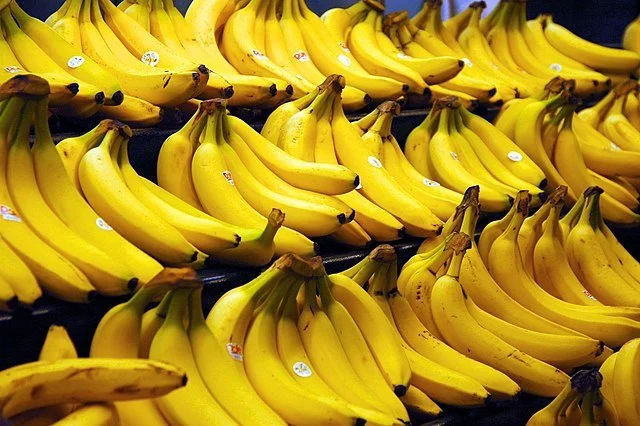No one thinks much about the plain old banana, but overall there is probably few other fruits that have had such an effect on the modern history of many parts of the world. Between 7,000 to 10,000 years ago, farmers in Southeast Asia began cultivating bananas as a food source, which then spread over time into the Indian sub-continent. Arab traders of the 9th century spread the banana even further; across the Middle East, Africa, and portions of the Mediterranean. They were followed by the Portuguese, who took the fruit across the Atlantic to the Caribbean and Central America.
Despite the worldwide spread of bananas, they weren't really all that popular or well known in the western world (the U.S., Canada, and Europe) until around the 1870's. A combination of modern rail and steamship networks with the invention of refrigeration made it viable to carry bananas long distances prior to ripening, bringing the fruit to consumers who quickly fell in love with them. Bananas were yellow, sweet, and shaped like dicks. What wasn't there to love? Well, this being Professor Errare, you can bet your ass things went bad pretty quickly.
By the end of the 19th century, most of the banana exports to the developed world came from countries along the Caribbean basin. The trade was dominated by two massive vertically integrated behemoths called the United Fruit Company (today known as Chiquita) and the Standard Fruit Company (today known as Dole). Both companies owned everything dealing with bananas; from the plantations where they were grown, to the ships that brought them over the ocean, clear to the trucks that delivered them to local mercantile. The fruit's cheap price helped fuel an amazing growth in demand for bananas, and both United and Standard saw keeping prices low as being of the utmost importance.
With such conditions present, it goes without saying that things got out of hand. At first the activities of United and Standard were rather benign, at least relative to the activities of other evil corporations. Local officials were bribed, people were kicked off their land to make way for expanding plantations, and those same people were then hired to work in said plantations for dirt low wages. You know, pretty hum-drum every day kind of stuff. However, things began to escalate when the people of Central America began to wake up to the fact that they were getting the shit end of the stick. What with living in democracies and all, the citizens of many of these countries began to elect governments that opposed the banana monopolies. The banana monopolies responded by using mercenaries, and even at times the U.S. Marines, to overthrow said governments, putting in place pseudo-dictators who were under their control. Via these methods, by the 1930's numerous countries were under the sway of United and Standard, with Guatemala and Honduras almost completely under corporate control.
The people of these Banana Republics, understandably a little less than pleased by this turn of events, resisted as well as they could, mostly via strikes and protests. The banana companies responded by having their puppets send out the military to shoot anyone who got out of line. By the 1950's, United and Standard convinced the U.S. government to help them overthrow several governments again, based upon charges that said governments were dominated by communists. To be fair, this was likely true. Though to also be fair, the rise of communism in said countries was likely due to the banana companies just treating pretty much everybody like shit. The rule of the banana monopolies set back the economic development of many of these countries by decades, led to long lasting civil wars, and caused widespread environmental harm. Their power did not begin to wane until the 1970's, after the U.S. government finally began to crack down on United and Standard for violating anti-trust laws. That's right, it wasn't decades of pure evil that caused the United States to react, but the idea that the companies were overcharging American consumers for a product that cost 50 cents per pound. Under increasing litigation at home, the old monopolies lost much of their former power, resulting in most Caribbean countries getting out from underneath their thumbs.
Luckily, today we can sit down and see how much of a banana we can fit in our mouth at one time without any worries of the horrible past of this most delicious fruit. Wait what's that? In 2007, Chiquita was convicted of hiring and arming a terrorist organization to silence union leaders and intimidate farmers? Really, they got convicted of that and nobody went to prison? They just paid a fine? Well shit, never mind then. I guess bananas are still evil as all get out.
Image: https://commons.wikimedia.org/wiki/File:Bananas.jpg
